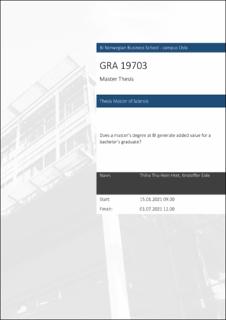Does a master’s degree at BI generate added value for a bachelor’s graduate?
Master thesis
Permanent lenke
https://hdl.handle.net/11250/2789386Utgivelsesdato
2021Metadata
Vis full innførselSamlinger
- Master of Science [1621]
Sammendrag
The aim of our master thesis is to investigate whether taking a master’s degree at
BI Norwegian Business School generates added value in terms of lifetime salary
earnings for a bachelor graduate. In addition, we plan to interpret and examine the
main contributing factors that give the student the added value from attending the
master’s degree at BI.
By performing an empirical study and creating our own tailor-made NPV model
that is well-suited to a BI student, we found out that attending a master’s degree
contributes to an added value by generating a positive NPV of NOK 3.5 million.
We also analyze the importance of the key variables contributing to the added
value by formulating a regression model to study the impact of different factors
on educational returns (i.e. salary). Consequently, we found out that ‘Master
program’, ‘Age’, ‘Male’, ‘Grade’, ‘EFCAB’ and ‘TESLO’ are the most
significant variables that explain the added value to the starting salary of BI
graduates.
Simultaneously, we acknowledge that there is a concern of endogeneity in our
analyses and that this could lead to a bias in our results, meaning that the key
dependent variable ‘salary’ and the independent variable “Master program” could
be influenced by other unobservable endogenous variables such as human capital.
This could impact not only the student’s decision whether he/she should attend a
master’s program, but also impact his/her starting salary at a later stage. Despite
this concern, we believe our findings and results give valuable insights into the
valuation of a master’s degree.
In conclusion, our thesis suggests that pursuing a master’s degree at BI is a
profitable and worthy long-term investment for students and therefore, we
recommend that bachelor students should invest their time and effort in a 2-year
master’s program for lifetime value creation.
Beskrivelse
Masteroppgave(MSc) in Master of Science in Business, Finance - Handelshøyskolen BI, 2021
